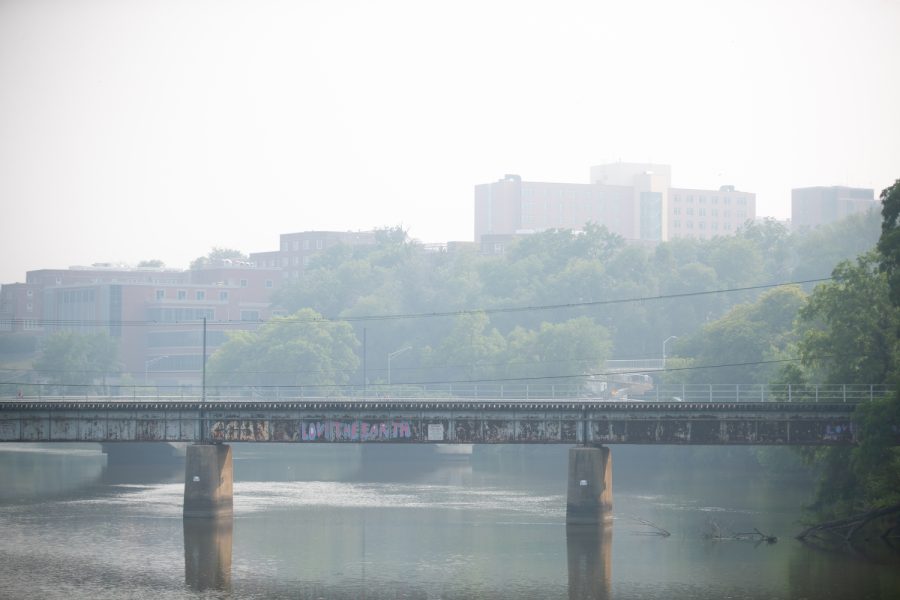Smoke from Canadian wildfires covers Iowa, the Midwest in haze
The smoke, which had already hit the Eastern U.S., first arrived in Iowa on Tuesday, proceeding to cover the state with a haze that is unprecedented.
The Iowa River is seen in Iowa City on Tuesday, June 27, 2023.
June 28, 2023
Iowans encountered a hazy surprise on Tuesday, June 27 when smoke from the ongoing wildfires in Canada began spreading around the Midwest.
In what has been dubbed the “worst wildfire season” in Canadian history, fires that broke out in the U.S.’s northern neighbor have since covered the U.S. in smoke that has broken records due to its harmful effects on air quality. The smoke has also led states on the east coast to see an orange haze in the sky.
While the smoke hasn’t had the same visual effect in Iowa, it has negatively impacted the air quality. A news release from the Iowa Department of Natural Resources Tuesday morning was the first air quality alert.
In it, the DNR wrote that particulates in the air were at a level that the Environmental Protection Agency considers unhealthy. The DNR recommended that people should reduce or avoid strenuous outdoor physical activity and take more breaks if choosing to work out.
Todd Russell, an Iowa DNR environmental specialist with the air quality bureau, said the smoke is unlike anything he had experienced in his time with the DNR.
“I’ve been doing this for 24 years and this is fairly historic. We have seen levels similar to this before, but historically they were always in conjunction with either a local fire, prescribed burn, or possibly fireworks on the Fourth of July,” Russell said. “What we’re seeing now is levels similar to those levels pretty much statewide. So this is a fairly historic event.”
Russell said that Iowa normally has good air quality, with it sometimes reaching moderate levels. He added that unhealthy levels normally meant the air posed a risk for sensitive groups, namely the elderly, people with asthma, and young children.
But in this case, the air quality level was sufficiently poor enough that it posed a health concern even for healthy adults and reiterated the department’s suggestion to avoid strenuous activity. According to AirNow, a government website that has information about air quality around the country, Iowa had an air quality of 191 out of 500, which is classified as unhealthy.
Some eastern cities in Iowa, had even higher numbers, such as Dubuque which was rated as 207, classified as very unhealthy.
RELATED: 15 years since devastation — recovery, reconstruction, and advancements since the 2008 Iowa floods
Russell said the DNR had been tracking the smoke for a while, but had no idea the smoke would be as bad as it was. As for when the smoke might begin to clear, Russell said it potentially would begin clearing Thursday afternoon through Friday, but that more could come next week.
“It will be a possibility until those fires are under control. And next week, we may have the double pleasure of breathing in firework smoke as well as wildfire smoke from Canada at the same time,” Russell said.
As for what residents should do, it’s a matter of preference, said Sam Jarvis, community health manager at Johnson County Public Health.
“It’s really up to the individual’s health and so, as mentioned, for those who are at serious [risk], or maybe they’re already experiencing those, it may be best to avoid outdoor activities if they can, certainly recreational type of things,” Jarvis said. “For those who are wondering about face masks, I know that the EPA would note that the N95 would be best, if possible, because it’s built for that very thing.”
He also recommended residents monitor the air quality index and to avoid outdoor activities if at risk of, or sensitive to the air quality.
In response to the health risks of the smoke, some are already canceling or moving outdoor events indoors. This includes the Iowa Wildlife Camps, which moved its programming indoors on Wednesday, said Ellen Carman, the program’s director.
“We did make the decision today that we needed to, in some cases, move programming inside where we could do that,” Carman said. “We just made that decision based on the guidance we had available to us from our environmental health and safety folks and their recommendations to protect our campers really their welfare and safety.”
She said the program, which serves pre-K to 12th grade, would resume normal operations once it received expert guidance to do so.
“We’re definitely taking it day by day and just kind of watching ‘How are the levels changing and how is the air quality in our community changing?’” she said.
Similar decisions are being made by the City of Iowa City, as it announced Wednesday it would be closing City Park Pool due to the smoke, and would keep the pool closed Thursday. Iowa City also closed City Park’s baseball fields, with games scheduled for the fields canceled.



